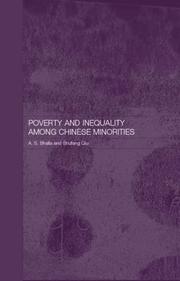| Listing 1 - 3 of 3 |
Sort by
|
Book
ISBN: 9004353712 9789004353718 9789004353633 9004353631 Year: 2018 Publisher: Leiden Boston
Abstract | Keywords | Export | Availability | Bookmark
 Loading...
Loading...Choose an application
- Reference Manager
- EndNote
- RefWorks (Direct export to RefWorks)
The book 'Southwest China in Regional and Global Perspectives (c. 1600-1911)' is dedicated to important issues in society, trade, and local policy in the southwestern provinces of Yunnan, Guizhou and Sichuan during the late phase of the Qing period. It combines the methods of various disciplines to bring more light into the neglected history of a region that witnessed a faster population growth than any other region in China during that age. The contributions to the volume analyse conflicts and arrangements in immigrant societies, problems of environmental change, the economic significance of copper as the most important ?export? product, topographical and legal obstacles in trade and transport, specific problems in inter-regional trade, and the roots of modern transnational enterprise.
Finance --- Funding --- Funds --- Economics --- Currency question --- History. --- China, Southwest --- Southwest China --- Economic conditions. --- Social conditions. --- Commerce --- S03/0612 --- S03/0624 --- S03/0625 --- S10/0210 --- S10/0220 --- S10/0300 --- S10/0610 --- S10/0620 --- History --- China: Geography, description and travel--Sichuan --- China: Geography, description and travel--Guizhou --- China: Geography, description and travel--Yunnan --- China: Economics, industry and commerce--General works and economic history: before 1840 --- China: Economics, industry and commerce--General works and economic history: 1840 - 1911 --- China: Economics, industry and commerce--Money and banking: general and before 1911 --- China: Economics, industry and commerce--Foreign trade and economic relations: before 1842 --- China: Economics, industry and commerce--Foreign trade and economic relations: 1842 - 1949 --- E-books

ISBN: 9780415308403 0415308402 Year: 2006 Volume: 22 Publisher: Abingdon Routledge
Abstract | Keywords | Export | Availability | Bookmark
 Loading...
Loading...Choose an application
- Reference Manager
- EndNote
- RefWorks (Direct export to RefWorks)
Ethnology --- Race discrimination --- Poor --- Racism in education --- Minorities --- Anthropologie sociale et culturelle --- Discrimination raciale --- Pauvres --- Racisme en éducation --- Minorités --- Economic conditions --- Social conditions --- Education --- Conditions économiques --- Conditions sociales --- China --- Chine --- Ethnic relations --- Relations interethniques --- S03/0624 --- S11/0534 --- S11/0550 --- S11/1200 --- S11/1215 --- S14/0454 --- S21/0500 --- Bias, Racial --- Discrimination, Racial --- Race bias --- Racial bias --- Racial discrimination --- Discrimination --- China: Geography, description and travel--Guizhou --- China: Social sciences--Class studies --- China: Social sciences--Social welfare system --- China: Social sciences--Anthropology, ethnology (incl. human palaeontology): general and China --- China: Social sciences--Works on national minorities and special groups: since 1949 --- China: Education--Education: since 1989 --- China: Medicine, public health and food--Public health, hospitals, medical schools, etc --- Ethnic relations.
Book
ISBN: 0801462789 0801462770 0801449685 9780801462771 9780801449680 9780801462788 Year: 2011 Publisher: Ithaca, NY
Abstract | Keywords | Export | Availability | Bookmark
 Loading...
Loading...Choose an application
- Reference Manager
- EndNote
- RefWorks (Direct export to RefWorks)
How can policymakers effectively reduce poverty? Most mainstream economists advocate promoting economic growth, on the grounds that it generally reduces poverty while bringing other economic benefits. However, this dominant hypothesis offers few alternatives for economies that are unable to grow, or in places where economic growth fails to reduce or actually exacerbates poverty. In Small Works, John A. Donaldson draws on his extensive fieldwork in two Chinese provinces-Yunnan and Guizhou-that are exceptions to the purported relationship between economic growth and poverty reduction. In Yunnan, an outward-oriented developmental state, one that focuses on large-scale, urban development, has largely failed to reduce poverty, even though it succeeded in stimulating economic growth. Provincial policy shaped roads, tourism, and mining in ways that often precluded participation by poor people. By contrast, Guizhou is a micro-oriented state, one that promotes small-scale, low-skill economic opportunities-and so reduces poverty despite slow economic growth. It is no coincidence that this Guizhou approach parallels the ideas encapsulated in the "scientific development view" of China's current president Hu Jintao. After all, Hu, when Guizhou's leader, helped establish the micro-oriented state in the province. Donaldson's conclusions have implications for our understanding of development and poverty reduction, economic change in China, and the thinking behind China's policy decisions.
Poverty --- Economic development --- Development, Economic --- Economic growth --- Growth, Economic --- Destitution --- Yunnan Sheng (China) --- Guizhou Sheng (China) --- Kweichau (China) --- Kwei-chow (China : Province) --- Kuei-chou sheng (China) --- Kweichow (China : Province) --- Kishū-shō (China) --- Kuei-chou (China : Province) --- Kweichow Province (China) --- Kweichow, China (Province) --- Gui Zhou (China : Province) --- Kuei-chou sheng jen min cheng fu (China) --- Guizhousheng (China) --- Yünnan, China (Province) --- Yün-nan sheng (China) --- Yunnan Province (China) --- Yün-nan (China : Province) --- Unnan-shō (China) --- Unnanshō (China) --- Yün-nan sheng jen min cheng fu (China) --- Yün-nan sheng cheng fu (China) --- Yun Nan Province (China) --- 云南省 (China) --- Economic conditions. --- Economic policy --- Economics --- Statics and dynamics (Social sciences) --- Development economics --- Resource curse --- Wealth --- Basic needs --- Begging --- Poor --- Subsistence economy --- 贵州省 (China) --- E-books --- S03/0523 --- S03/0624 --- S10/0251 --- S11/0550 --- China: Geography, description and travel--Travels: since 1989 --- China: Geography, description and travel--Guizhou --- China: Economics, industry and commerce--General works and economic history: since 1989 --- China: Social sciences--Social welfare system
| Listing 1 - 3 of 3 |
Sort by
|

 Search
Search Feedback
Feedback About UniCat
About UniCat  Help
Help News
News